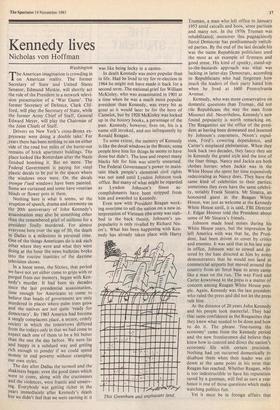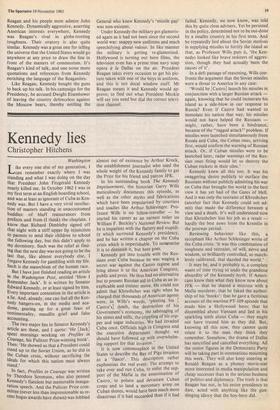Kennedy lives
Nicholas von Hoffman
Washington
The American imagination is crowding in on American reality. The former Secretary of State and United States Senator, Edmund Muskie, will shortly act the role of the President in a network televi- sion presentation of a 'War Game'. The former Secretary of Defence, Clark Clif- ford, will play the Secretary of State, while the former Army Chief of Staff, General Edward Meyer, will play the Chairman of the Joint Chiefs of Staff.
Drivers on New York's cross-Bronx ex- pressway were doing a double take: For .years there has been nothing to see on either side of the road but miles of the burnt-out remains of brick apartment buldings. The place looked like Rotterdam after the Nazis finished bombing it. But no more. The Federal Government is paying for vinyl plastic decals to be put in the spaces where the windows once were. On the decals trompe l'oeil windows have been painted. Some are curtained and some have venetian blinds or flower pots in them,
Nothing here is what it seems, so the eruption of speech, drama and ceremony on the 20th anniversary of John Kennedy's assassination may also be something other than the remembered grief of millions for a president foully murdered, For almost everyone here over the age of 30, the death in Dallas is a milestone in personal time. One of the things Americans do is ask each other where they were and what they were doing at the hour the news bulletins broke into the routine inanities of the daytime television shows.
In a loose sense, the Sixties, that period we have not yet either come to grips with or Purged from our memory, began with Ken- nedy's murder. It had been six decades since the last presidential assassination, time enough for Americans to come to believe that heads of government are only murdered in places where palm trees grow and the natives are not quite 'ready for democracy'. By 1963 America had become a snugly complacent place, a secure, comfy society in which the tomorrows differed from the todays only in that we had come to expect each one of them to be a bit better than the one the day before. We were fat and happy in a subdued way and getting rich enough to ponder if we could spend money to end poverty without cramping our own styles.
The day after Dallas the turmoil and the shakiness began: even the good times which were to come, along with the crazinesses and the violences, were frantic and unnerv- ing. Everybody was getting richer in the Years immediately after Kennedy's death but we didn't feel that we were earning it: it was like being lucky in a casino.
In death Kennedy was more popular than in life. Had he lived to try for re-election in 1964 he might not have made it back for a second term. The national grief for William McKinley, who was assassinated in 1901 at a time when he was a much more popular president than Kennedy, was every bit as great as it would later be for the hero of Camelot, but by 1920 McKinley was locked up in the history books, a personage of the past. Kennedy, however, lives on, his is a name still invoked, and not infrequently by Ronald Reagan.
To some extent, the memory of Kennedy is like the decal windows in the Bronx; some people love him for things he seems to have done but didn't. The love and respect many blacks felt for him was utterly unearned. The Federal Government's power to main- tain black people's elemental civil rights was not used until Lyndon Johnson took office. But many of what might be regarded as Lyndon Johnson's finest ac- complishments have been stripped from him and awarded to Kennedy.
Even now with President Reagan work- ing overtime to sell the nation on a new in- terpretation of Vietnam (the army was stab- bed in the back thesis), Johnson's un- popularity is only rivalled by Richard Nix- on's. What has been happening with Ken- nedy has already taken place with Harry This Greenham and unpleasant land. Truman, a man who left office in January 1953 amid catcalls and boos, some partisan and many not. In the 1970s Truman was rehabilitated; moreover this pugnaciously fierce Democrat has posthumously switch- ed parties. By the end of the last decade his was the name Republican politicians used the most as an example of firmness and good sense. His kind of spunky, stand-up- to-the-bastards approach was what was lacking in latter-day Democrats, according to Republicians who had forgotten how ,much the leaders of their party hated him when he lived at 1600 Pennsylvania Avenue.
Kennedy, who was more conservative on domestic questions than Truman, did not rile Republicans the way the man from Missouri did. Nevertheless, Kennedy's new found popularity is worth remarking on.
The Reaganites see the office of the presi- dent as having been demeaned and lessened by Johnson's coarseness, Nixon's expul- sion, Ford's cowering dependence, and Carter's misplaced plebeianism. When they look back two decades, they fancy they see in Kennedy the grand style and the love of the finer things. Nancy and Jackie are both clothes horses: when Jackie was in the White House she spent her time expensively redecorating as Nancy does. They have the
same kind of celebrities to their parties; sometimes they even have the same celebri-
ty, notably Frank Sinatra. Mr Sinatra, an honoured guest in the Reagan White House, was just as welcome at the Kennedy White House until, it is said, FBI Director J. Edgar Hoover told the President about some of Mr Sinatra's friends.
Johnson made loud noises during his White House years, but the impression he left America with was that he, the Presi- dent, had been driven to cover by critics and enemies. It was said that in his last year in office, Johnson was so cowed and jit- tered by the hate directed at him by noisy demonstrators that he would not land at commercial airports but moved around the country from air force base to army camp like a man on the run. The way Ford and
Carter kowtowed to the press is a matter of concern among Reagan White House peo- ple. Again, Kennedy was the last president who ruled the press and did not let the press rule him.
At the distance of 20 years John Kennedy and his people look masterful. They had that same confidence as the Reaganites that they knew what needed to be done and how to do it. The phrase 'fine-tuning the economy' came from the Kennedy period and the new frontiersmen did believe they knew how to control and direct the nation's economic life with certain precision. Nothing had yet occurred domestically to disabuse them when their leader was cut down at the same point in his term that Reagan has reached. Whether Reagan, who is too indestructible to have his reputation saved by a gunman, will feel as sure a year hence is one of those questions which make watching politics fun.
Yet it must be in foreign affairs that Reagan and his people most admire John Kennedy. Dynamically aggressive, asserting American interests everywhere, Kennedy was Reagan's rival in globe-trotting toughness. Their oratory is also quite similar. Kennedy was a great one for telling the universe that the United States would go anywhere at any price to draw the line in front of the masters of communism. It's Reagan's kind of talk, and one notes more quotations and references from Kennedy enriching the language of the Reaganites.
Like Reagan, Kennedy bought the guns to back up his talk. In his campaign for the Presidency, he accused Dwight Eisenhower of leaving the country defenceless against the Moscow bears, thereby nettling the General who knew Kennedy's `missile gap' was non-existent.
Under Kennedy the military got glamoris- ed again as it had not been since the second world war: snappy new uniforms and much speechifying about valour. In like manner the military is getting re-glamorised. Hollywood is turning out hero films, the television even has a prime time navy soap opera a la Dallas on the air. President Reagan takes every occasion to get his pic- ture taken with one of the boys in uniform, and this is not decal window stuff. Mr Reagan means it and Kennedy would ap- prove; to find out what President. Muskie will say you need but dial the correct televi- sion channel.



























































 Previous page
Previous page